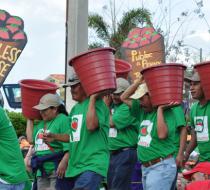Taco Bell Boycott Favorite
For years, workers in Florida’s tomato fields have endured poverty wages and terrible working conditions. In 1993, a small, community-based organization called the Coalition of Immokalee Workers (CIW) formed to demand an end to these unfair labor practices. By 2005, they had won a boycott campaign against Taco Bell, one of the largest fast-food corporations in the world, raising wages by almost seventy-five percent and setting an inspiring precedent for farm worker organizing.
The boycott win was an unqualified victory. All demands were met, including the first-ever ongoing, direct payment to farm workers
The Coalition of Immokalee Workers began by developing a list of concrete demands that, if met, would realize their vision of social justice in the fields. These were later refined into “fair food principles” which would bring tangible benefits to their base, and were sufficiently clear that the workers could know whether or not they had succeeded in their campaign.
Once they had established their goals, the CIW identified tomato growers as the group that had the power to give them what they wanted. The CIW fought a well-organized campaign targeting the growers, engaging in three community-wide work stoppages and a high-profile hunger strike. The CIW was able to win the first wage increase in twenty years, but wages were still well below the poverty level. They realized that they, the workers alone, did not have the power to force their target to capitulate, so they looked for another target.
The CIW identified the corporations that bought from the growers, including Taco Bell, as a secondary target. Taco Bell’s success, unlike that of the growers, depended on its public image. The CIW also identified potential allies that could help them put pressure on their target. They reached out to students, because Taco Bell targeted them as consumers. They also allied themselves with social justice-oriented religious groups.
In 2001, the CIW launched the boycott of Taco Bell, calling on the fast-food giant to take responsibility for human rights violations in their supply chain, to improve wages and working conditions by passing on a penny-per-pound pay increase to the workers, and to buy only from Florida growers who passed this penny per pound payment on to the farm workers.
The CIW-led campaign organized cross-country caravans that held rallies outside Taco Bell restaurants; students organized petitions to “Boot the Bell” from campus food courts; religious, labor and community leaders were approached to publicly endorse the boycott and further isolate Taco Bell from support; and they directly targeted Taco Bell headquarters with public hunger strikes and marches.
After four years of actions by the CIW and their allies, Taco Bell conceded. The boycott win was an unqualified victory. All demands were met, including the first-ever ongoing, direct payment to farm workers, substantially raising their wages, and an enforceable code of conduct. The agreement was a clear victory for the workers who struggled for it against an intransigent target, and helped bring renewed energy to the fair-food movement.
(Reposted from www.beautifultrouble.org)






